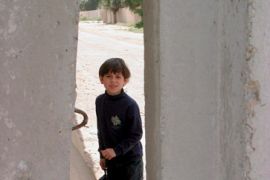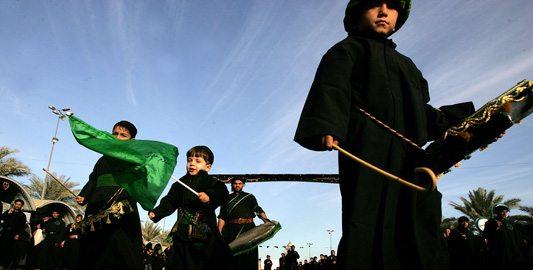Iraq Diary: A divided generation
Hoda Abdel Hamid reflects on the country’s isolated youth.

 |
| A number of children take part in a procession marking Ashura in Karbala [GALLO/GETTY] |
Ashura – one of the most important Shia religious festivals – started on Thursday night and continues until Saturday. So I asked a Shia friend of mine to explain its meaning to me.
He told me that, historically, Ashura commemorates the date in AD 680 when the grandson of Prophet Muhammad, Imam Al-Hussein was killed in Karbala by Al-Shimir bin Thil Jawshan, a military commander in the Umayyad army dispatched from Damascus.
Every year since then, thousands of Shia pilgrims have journeyed to Karbala, south of Baghdad, usually by foot.
After getting the full background brief, my friend and I went into a debate about the differences between Sunnis and Shias. The conversation was lively and often funny. I was uneasy at first when a Sunni sitting with us made fun of a Shia or vice-versa.
I thought it was politically incorrect and we should avoid having this kind of language.
But then I noticed, I was the only one feeling uneasy and it struck me that despite the killing and the suffering in Iraq in recent years there is a way out of sectarianism here.
Iraqis have always said there are no differences between them. They say it is politics that divides them, specifically the new constitution that effectively divided governance proportionally among the different religious and/or sectarian groups here.
Another person who was listening in said that he was worried about the younger generation.
He blamed schools for teaching children that there is a difference between Shias and Sunnis. He also said that his 12-year-old son has not spoken to a Sunni in five years and has grown to fear them. The father said he was so angry, he wanted to sell his home and move to another district where there is no religious influence.
I heard this same complaint from Omar, a Sunni man. He is a member of the so-called Awakening Councils, groups of volunteers who fight al-Qaeda in their areas. It is the young who worry him the most.
“They are young, they have energy and they think they are immortal,” he said.
Omar is 34 but considers himself an elder. He explains that many young Iraqis have not been going to school for several years now and many have not even stepped out of their districts.
Staring at the floor, he said: “They do not even know the other side anymore. Before we were isolated from the rest of the world, now we are isolated in our own country”.
He then added: “We are a rich country, we have lots of resources, we could live as comfortably as the Gulf countries, but we spend our time creating problems and vowing revenge.”
Revenge is a huge concept in the tribal culture. “If you kill my cousin, I will have to kill you to safeguard the tribe’s honor,” is a common phrase which prevails here.
Omar says that this is one aspect US soldiers did not grasp in the early years of the invasion and is one of the reasons so many Iraqis turned against them so quickly.
He looks at me and sighs. “I never thought I would long for the days of Saddam, just for the security. Can’t you see that Iraqis need an iron fist to rule them?”